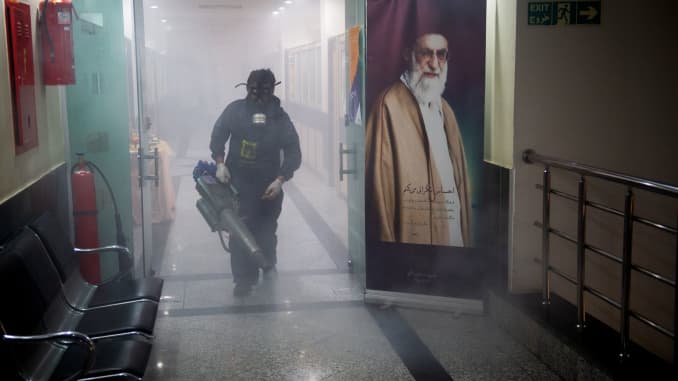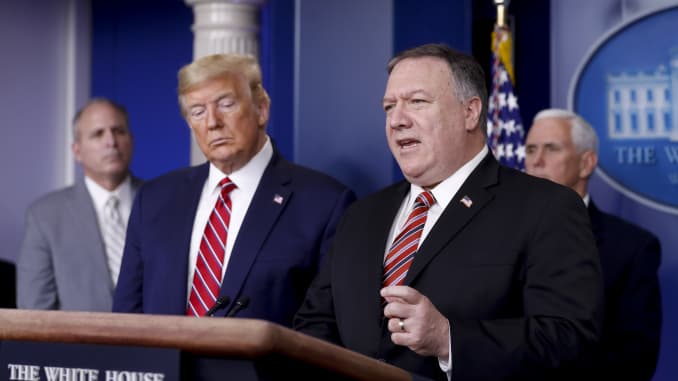KEY POINTS
- The Trump administration said it would not offer sanctions relief to Iran as the deadly coronavirus outbreak further isolates and cripples the Middle Eastern nation.
- Iran’s health ministry has said that one person dies from coronavirus every 10 minutes and 50 are becoming infected every hour.
- “The whole world should know that humanitarian assistance to Iran is wide open, it’s not sanctioned,” Secretary of State Mike Pompeo said.
Mike Pompeo, U.S. secretary of state, speaks as U.S. President Donald Trump, second left, listens during a Coronavirus Task Force news conference in the briefing room of the White House in Washington, D.C., U.S., on Friday, March 20, 2020.
Al Drago | Bloomberg | Getty Images
WASHINGTON — The Trump administration said Friday it would not offer sanctions relief to Iran as the deadly coronavirus outbreak further isolates and cripples the Middle Eastern nation.
“The whole world should know that humanitarian assistance to Iran is wide open, it’s not sanctioned,” Secretary of State Mike Pompeo said during a Friday briefing with President Donald Trump at the White House.
“We are doing everything we can to facilitate the humanitarian assistance moving in and to make sure that the financial transactions connected to that can take place as well. There is no sanction on medicines going to Iran, there is no sanctions on humanitarian assistance going into that country. They’ve got a terrible problem there and we want that humanitarian, medical assistance to get to the people of Iran,” the nation’s top diplomat added.
When asked again whether the administration would consider lifting U.S. sanctions on Iran, President Donald Trump doubled down by saying, “They know the answer, the leaders of Iran, they know the answer to your question.”
The latest revelation comes as the U.S. imposed new sanctions this week. The Trump administration blacklisted five companies based in the United Arab Emirates, three in mainland China, three in Hong Kong and one in South Africa for doing business with Iran’s petrochemical sector.
The virus — which has already killed more than 10,031 people and infected more than 245,000 people around the world — is spreading as the Iranian regime deals with intensifying U.S. sanctions.

A firefighter uses a fog machine to disinfect the city hall building following the outbreak of coronavirus in Tehran, Iran, on Wednesday, March 18, 2020.
Ali Mohammadi | Bloomberg via Getty Images
Tehran has urged other countries to back its call for the lifting of U.S. sanctions due to the coronavirus pandemic.
“Unlawful US sanctions drained Iran’s economic resources, impairing ability to fight #COVID19,” Iranian Foreign Minister Mohammad Javad Zarif tweeted on Tuesday.
Unlawful US sanctions drained Iran’s economic resources, impairing ability to fight #COVID19.They literally kill innocentsIt is immoral to observe them: doing so has never saved anyone from future US wrathJoin the growing global campaign to disregard US sanctions on Iran.
4,403 people are talking about this
The sanctions are the latest move in aggressive tit-for-tat exchanges between Tehran and Washington that began in 2018, when Trump unilaterally withdrew from a 2015 international agreement to limit Iran’s nuclear program.
Earlier this year, Pompeo and Treasury Secretary Steven Mnuchin announced new sanctions days after Iran fired missiles at U.S. targets in Iraq in retaliation for an American airstrike in Baghdad that killed Iran’s top military leader, Qasem Soleimani.
After the January missile strikes, President Donald Trump said the U.S. will “immediately impose additional punishing economic sanctions on the Iranian regime.”
In December, State Department officials said that the maximum pressure campaign on Iran will intensify in 2020, as the U.S. seeks to rein in Tehran’s pursuit of nuclear infrastructure and regional aggression.
“There will be more sanctions to come, and Iran’s economic problems and challenges are going to compound in 2020,” a senior State Department official said on a Dec. 30 call with reporters. “They are already deep into a recession, and we are also seeing Iran come under greater diplomatic isolation.”


No comments:
Post a Comment